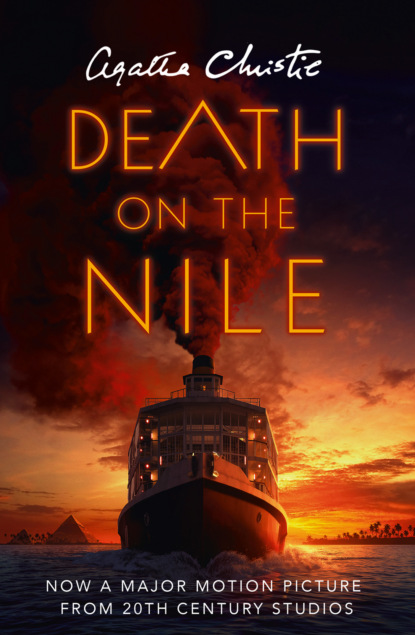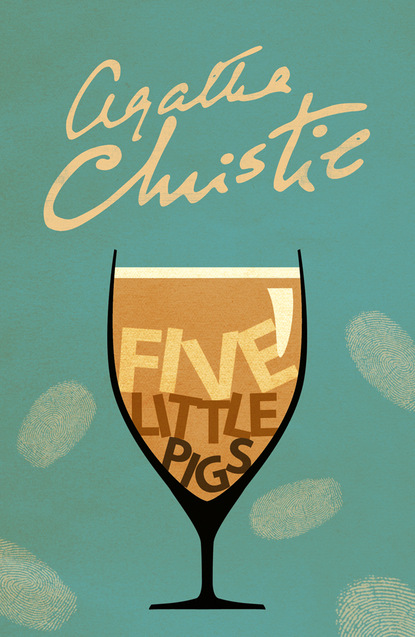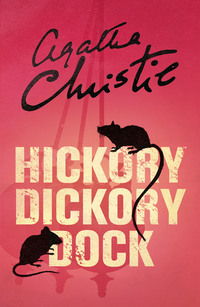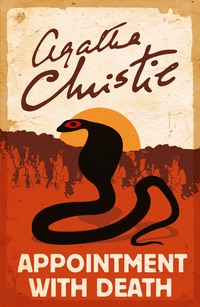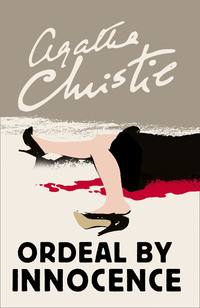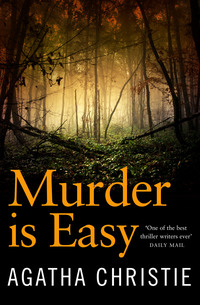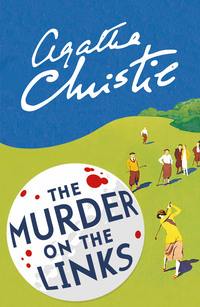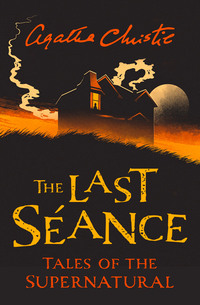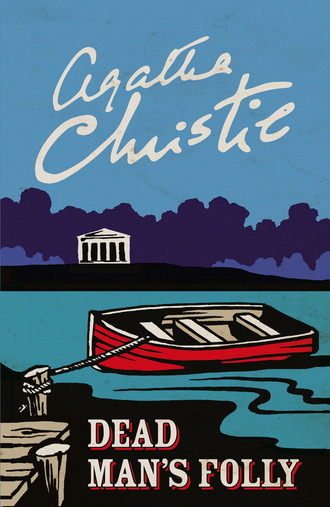
Полная версия
Dead Man’s Folly
‘We pass by the boathouse this way,’ Mrs Oliver explained.
As she spoke the boathouse came into view. It jutted out on to the river and was a picturesque thatched affair.
‘That’s where the Body’s going to be,’ said Mrs Oliver. ‘The body for the Murder Hunt, I mean.’
‘And who is going to be killed?’
‘Oh, a girl hiker, who is really the Yugoslavian first wife of a young Atom Scientist,’ said Mrs Oliver glibly.
Poirot blinked.
‘Of course it looks as though the Atom Scientist had killed her – but naturally it’s not as simple as that.’
‘Naturally not – since you are concerned…’
Mrs Oliver accepted the compliment with a wave of the hand.
‘Actually,’ she said, ‘she’s killed by the Country Squire – and the motive is really rather ingenious – I don’t believe many people will get it – though there’s a perfectly clear pointer in the fifth clue.’
Poirot abandoned the subtleties of Mrs Oliver’s plot to ask a practical question:
‘But how do you arrange for a suitable body?’
‘Girl Guide,’ said Mrs Oliver. ‘Sally Legge was going to be it – but now they want her to dress up in a turban and do the fortune telling. So it’s a Girl Guide called Marlene Tucker. Rather dumb and sniffs,’ she added in an explanatory manner. ‘It’s quite easy – just peasant scarves and a rucksack – and all she has to do when she hears someone coming is to flop down on the floor and arrange the cord round her neck. Rather dull for the poor kid – just sticking inside that boathouse until she’s found, but I’ve arranged for her to have a nice bundle of comics – there’s a clue to the murderer scribbled on one of them as a matter of fact – so it all works in.’
‘Your ingenuity leaves me spellbound! The things you think of !’
‘It’s never difficult to think of things,’ said Mrs Oliver. ‘The trouble is that you think of too many, and then it all becomes too complicated, so you have to relinquish some of them and that is rather agony. We go up this way now.’
They started up a steep zig-zagging path that led them back along the river at a higher level. At a twist through the trees they came out on a space surmounted by a small white pilastered temple. Standing back and frowning at it was a young man wearing dilapidated flannel trousers and a shirt of rather virulent green. He spun round towards them.
‘Mr Michael Weyman, M. Hercule Poirot,’ said Mrs Oliver.
The young man acknowledged the introduction with a careless nod.
‘Extraordinary,’ he said bitterly, ‘the places people put things! This thing here, for instance. Put up only about a year ago – quite nice of its kind and quite in keeping with the period of the house. But why here? These things were meant to be seen – “situated on an eminence” – that’s how they phrased it – with a nice grassy approach and daffodils, et cetera. But here’s this poor little devil, stuck away in the midst of trees – not visible from anywhere – you’d have to cut down about twenty trees before you’d even see it from the river.’
‘Perhaps there wasn’t any other place,’ said Mrs Oliver.
Michael Weyman snorted.
‘Top of that grassy bank by the house – perfect natural setting. But no, these tycoon fellows are all the same – no artistic sense. Has a fancy for a “Folly,” as he calls it, orders one. Looks round for somewhere to put it. Then, I understand, a big oak tree crashes down in a gale. Leaves a nasty scar. “Oh, we’ll tidy the place up by putting a Folly there,” says the silly ass. That’s all they ever think about, these rich city fellows, tidying up! I wonder he hasn’t put beds of red geraniums and calceolarias all round the house! A man like that shouldn’t be allowed to own a place like this!’
He sounded heated.
‘This young man,’ Poirot observed to himself, ‘assuredly does not like Sir George Stubbs.’
‘It’s bedded down in concrete,’ said Weyman. ‘And there’s loose soil underneath – so it’s subsided. Cracked all up here – it will be dangerous soon…Better pull the whole thing down and re-erect it on the top of the bank near the house. That’s my advice, but the obstinate old fool won’t hear of it.’
‘What about the tennis pavilion?’ asked Mrs Oliver.
Gloom settled even more deeply on the young man.
‘He wants a kind of Chinese pagoda,’ he said, with a groan. ‘Dragons if you please! Just because Lady Stubbs fancies herself in Chinese coolie hats. Who’d be an architect? Anyone who wants something decent built hasn’t got the money, and those who have the money want something too utterly goddam awful!’
‘You have my commiserations,’ said Poirot gravely.
‘George Stubbs,’ said the architect scornfully. ‘Who does he think he is? Dug himself into some cushy Admiralty job in the safe depths of Wales during the war – and grows a beard to suggest he saw active naval service on convoy duty – or that’s what they say. Stinking with money – absolutely stinking!’
‘Well, you architects have got to have someone who’s got money to spend, or you’d never have a job,’ Mrs Oliver pointed out reasonably enough. She moved on towards the house and Poirot and the dispirited architect prepared to follow her.
‘These tycoons,’ said the latter bitterly, ‘can’t understand first principles.’ He delivered a final kick to the lopsided Folly. ‘If the foundations are rotten – everything’s rotten.’
‘It is profound what you say there,’ said Poirot. ‘Yes, it is profound.’
The path they were following came out from the trees and the house showed white and beautiful before them in its setting of dark trees rising up behind it.
‘It is of a veritable beauty, yes,’ murmured Poirot.
‘He wants to build a billiard room on,’ said Mr Weyman venomously.
On the bank below them a small elderly lady was busy with sécateurs on a clump of shrubs. She climbed up to greet them, panting slightly.
‘Everything neglected for years,’ she said. ‘And so difficult nowadays to get a man who understands shrubs. This hillside should be a blaze of colour in March and April, but very disappointing this year – all this dead wood ought to have been cut away last autumn –’
‘M. Hercule Poirot, Mrs Folliat,’ said Mrs Oliver.
The elderly lady beamed.
‘So this is the great M. Poirot! It is kind of you to come and help us tomorrow. This clever lady here has thought out a most puzzling problem – it will be such a novelty.’
Poirot was faintly puzzled by the graciousness of the little lady’s manner. She might, he thought, have been his hostess.
He said politely:
‘Mrs Oliver is an old friend of mine. I was delighted to be able to respond to her request. This is indeed a beautiful spot, and what a superb and noble mansion.’
Mrs Folliat nodded in a matter-of-fact manner.
‘Yes. It was built by my husband’s great-grandfather in 1790. There was an Elizabethan house previously. It fell into disrepair and burned down in about 1700. Our family has lived here since 1598.’
Her voice was calm and matter of fact. Poirot looked at her with closer attention. He saw a very small and compact little person, dressed in shabby tweeds. The most noticeable feature about her was her clear china-blue eyes. Her grey hair was closely confined by a hairnet. Though obviously careless of her appearance, she had that indefinable air of being someone which is so hard to explain.
As they walked together towards the house, Poirot said diffidently, ‘It must be hard for you to have strangers living here.’
There was a moment’s pause before Mrs Folliat answered. Her voice was clear and precise and curiously devoid of emotion.
‘So many things are hard, M. Poirot,’ she said.
Chapter 3
It was Mrs Folliat who led the way into the house and Poirot followed her. It was a gracious house, beautifully proportioned. Mrs Folliat went through a door on the left into a small daintily furnished sitting-room and on into the big drawing-room beyond, which was full of people who all seemed, at the moment, to be talking at once.
‘George,’ said Mrs Folliat, ‘this is M. Poirot who is so kind as to come and help us. Sir George Stubbs.’
Sir George, who had been talking in a loud voice, swung round. He was a big man with a rather florid red face and a slightly unexpected beard. It gave a rather disconcerting effect of an actor who had not quite made up his mind whether he was playing the part of a country squire, or of a ‘rough diamond’ from the Dominions. It certainly did not suggest the navy, in spite of Michael Weyman’s remarks. His manner and voice were jovial, but his eyes were small and shrewd, of a particularly penetrating pale blue.
He greeted Poirot heartily.
‘We’re so glad that your friend Mrs Oliver managed to persuade you to come,’ he said. ‘Quite a brain-wave on her part. You’ll be an enormous attraction.’
He looked round a little vaguely.
‘Hattie?’ He repeated the name in a slightly sharper tone. ‘Hattie!’
Lady Stubbs was reclining in a big arm-chair a little distance from the others. She seemed to be paying no attention to what was going on round her. Instead she was smiling down at her hand which was stretched out on the arm of the chair. She was turning it from left to right, so that a big solitaire emerald on her third finger caught the light in its green depths.
She looked up now in a slightly startled childlike way and said, ‘How do you do.’
Poirot bowed over her hand.
Sir George continued his introductions.
‘Mrs Masterton.’
Mrs Masterton was a somewhat monumental woman who reminded Poirot faintly of a bloodhound. She had a full underhung jaw and large, mournful, slightly blood-shot eyes.
She bowed and resumed her discourse in a deep voice which again made Poirot think of a bloodhound’s baying note.
‘This silly dispute about the tea tent has got to be settled, Jim,’ she said forcefully. ‘They’ve got to see sense about it. We can’t have the whole show a fiasco because of these idiotic women’s local feuds.’
‘Oh, quite,’ said the man addressed.
‘Captain Warburton,’ said Sir George.
Captain Warburton, who wore a check sports coat and had a vaguely horsy appearance, showed a lot of white teeth in a somewhat wolfish smile, then continued his conversation.
‘Don’t you worry, I’ll settle it,’ he said. ‘I’ll go and talk to them like a Dutch uncle. What about the fortune-telling tent? In the space by the magnolia? Or at the far end of the lawn by the rhododendrons?’
Sir George continued his introductions.
‘Mr and Mrs Legge.’
A tall young man with his face peeling badly from sunburn grinned agreeably. His wife, an attractive freckled redhead, nodded in a friendly fashion, then plunged into controversy with Mrs Masterton, her agreeable high treble making a kind of duet with Mrs Masterton’s deep bay.
‘– not by the magnolia – a bottle-neck –’
‘– one wants to disperse things – but if there’s a queue –’
‘– much cooler. I mean, with the sun full on the house –’
‘– and the coconut shy can’t be too near the house – the boys are so wild when they throw –’
‘And this,’ said Sir George, ‘is Miss Brewis – who runs us all.’
Miss Brewis was seated behind the large silver tea tray.
She was a spare efficient-looking woman of forty-odd, with a brisk pleasant manner.
‘How do you do, M. Poirot,’ she said. ‘I do hope you didn’t have too crowded a journey? The trains are sometimes too terrible this time of year. Let me give you some tea. Milk? Sugar?’
‘Very little milk, mademoiselle, and four lumps of sugar.’ He added, as Miss Brewis dealt with his request, ‘I see that you are all in a great state of activity.’
‘Yes, indeed. There are always so many last-minute things to see to. And people let one down in the most extraordinary way nowadays. Over marquees, and tents and chairs and catering equipment. One has to keep on at them. I was on the telephone half the morning.’
‘What about these pegs, Amanda?’ said Sir George. ‘And the extra putters for the clock golf ?’
‘That’s all arranged, Sir George. Mr Benson at the golf club was most kind.’
She handed Poirot his cup.
‘A sandwich, M. Poirot? Those are tomato and these are paté. But perhaps,’ said Miss Brewis, thinking of the four lumps of sugar, ‘you would rather have a cream cake?’
Poirot would rather have a cream cake, and helped himself to a particularly sweet and squelchy one.
Then, balancing it carefully on his saucer, he went and sat down by his hostess. She was still letting the light play over the jewel on her hand, and she looked up at him with a pleased child’s smile.
‘Look,’ she said. ‘It’s pretty, isn’t it?’
He had been studying her carefully. She was wearing a big coolie-style hat of vivid magenta straw. Beneath it her face showed its pinky reflection on the dead-white surface of her skin. She was heavily made up in an exotic un-English style. Dead-white matt skin; vivid cyclamen lips, mascara applied lavishly to the eyes. Her hair showed beneath the hat, black and smooth, fitting like a velvet cap. There was a languorous un-English beauty about the face. She was a creature of the tropical sun, caught, as it were, by chance in an English drawing-room. But it was the eyes that startled Poirot. They had a childlike, almost vacant, stare.
She had asked her question in a confidential childish way, and it was as though to a child that Poirot answered.
‘It is a very lovely ring,’ he said.
She looked pleased.
‘George gave it to me yesterday,’ she said, dropping her voice as though she were sharing a secret with him. ‘He gives me lots of things. He’s very kind.’
Poirot looked down at the ring again and the hand outstretched on the side of the chair. The nails were very long and varnished a deep puce.
Into his mind a quotation came: ‘They toil not, neither do they spin…’
He certainly couldn’t imagine Lady Stubbs toiling or spinning. And yet he would hardly have described her as a lily of the field. She was a far more artificial product.
‘This is a beautiful room you have here, Madame,’ he said, looking round appreciatively.
‘I suppose it is,’ said Lady Stubbs vaguely.
Her attention was still on her ring; her head on one side, she watched the green fire in its depths as her hand moved.
She said in a confidential whisper, ‘D’you see? It’s winking at me.’
She burst out laughing and Poirot had a sense of sudden shock. It was a loud uncontrolled laugh.
From across the room Sir George said: ‘Hattie.’
His voice was quite kind but held a faint admonition. Lady Stubbs stopped laughing.
Poirot said in a conventional manner:
‘Devonshire is a very lovely county. Do you not think so?’
‘It’s nice in the daytime,’ said Lady Stubbs. ‘When it doesn’t rain,’ she added mournfully. ‘But there aren’t any nightclubs.’
‘Ah, I see. You like nightclubs?’
‘Oh, yes,’ said Lady Stubbs fervently.
‘And why do you like nightclubs so much?’
‘There is music and you dance. And I wear my nicest clothes and bracelets and rings. And all the other women have nice clothes and jewels, but not as nice as mine.’
She smiled with enormous satisfaction. Poirot felt a slight pang of pity.
‘And all that amuses you very much?’
‘Yes. I like the casino, too. Why are there not any casinos in England?’
‘I have often wondered,’ said Poirot, with a sigh. ‘I do not think it would accord with the English character.’
She looked at him uncomprehendingly. Then she bent slightly towards him.
‘I won sixty thousand francs at Monte Carlo once. I put it on number twenty-seven and it came up.’
‘That must have been very exciting, Madame.’
‘Oh, it was. George gives me money to play with – but usually I lose it.’
She looked disconsolate.
‘That is sad.’
‘Oh, it does not really matter. George is very rich. It is nice to be rich, don’t you think so?’
‘Very nice,’ said Poirot gently.
‘Perhaps, if I was not rich, I should look like Amanda.’ Her gaze went to Miss Brewis at the tea table and studied her dispassionately. ‘She is very ugly, don’t you think?’
Miss Brewis looked up at that moment and across to where they were sitting. Lady Stubbs had not spoken loudly, but Poirot wondered whether Amanda Brewis had heard.
As he withdrew his gaze, his eyes met those of Captain Warburton. The Captain’s glance was ironic and amused.
Poirot endeavoured to change the subject.
‘Have you been very busy preparing for the fête?’ he asked.
Hattie Stubbs shook her head.
‘Oh, no, I think it is all very boring – very stupid. There are servants and gardeners. Why should not they make the preparations?’
‘Oh, my dear.’ It was Mrs Folliat who spoke. She had come to sit on the sofa nearby. ‘Those are the ideas you were brought up with on your island estates. But life isn’t like that in England these days. I wish it were.’ She sighed. ‘Nowadays one has to do nearly everything oneself.’
Lady Stubbs shrugged her shoulders.
‘I think it is stupid. What is the good of being rich if one has to do everything oneself ?’
‘Some people find it fun,’ said Mrs Folliat, smiling at her. ‘I do really. Not all things, but some. I like gardening myself and I like preparing for a festivity like this one tomorrow.’
‘It will be like a party?’ asked Lady Stubbs hopefully.
‘Just like a party – with lots and lots of people.’
‘Will it be like Ascot? With big hats and everyone very chic?’
‘Well, not quite like Ascot,’ said Mrs Folliat. She added gently, ‘But you must try and enjoy country things, Hattie. You should have helped us this morning, instead of staying in bed and not getting up until teatime.’
‘I had a headache,’ said Hattie sulkily. Then her mood changed and she smiled affectionately at Mrs Folliat.
‘But I will be good tomorrow. I will do everything you tell me.’
‘That’s very sweet of you, dear.’
‘I’ve got a new dress to wear. It came this morning. Come upstairs with me and look at it.’
Mrs Folliat hesitated. Lady Stubbs rose to her feet and said insistently:
‘You must come. Please. It is a lovely dress. Come now!’
‘Oh, very well.’ Mrs Folliat gave a half-laugh and rose.
As she went out of the room, her small figure following Hattie’s tall one, Poirot saw her face and was quite startled at the weariness on it which had replaced her smiling composure. It was as though, relaxed and off her guard for a moment, she no longer bothered to keep up the social mask. And yet – it seemed more than that. Perhaps she was suffering from some disease about which, like many women, she never spoke. She was not a person, he thought, who would care to invite pity or sympathy.
Captain Warburton dropped down in the chair Hattie Stubbs had just vacated. He, too, looked at the door through which the two women had just passed, but it was not of the older woman that he spoke. Instead he drawled, with a slight grin:
‘Beautiful creature, isn’t she?’ He observed with the tail of his eye Sir George’s exit through a french window with Mrs Masterton and Mrs Oliver in tow. ‘Bowled over old George Stubbs all right. Nothing’s too good for her! Jewels, mink, all the rest of it. Whether he realizes she’s a bit wanting in the top storey, I’ve never discovered. Probably thinks it doesn’t matter. After all, these financial johnnies don’t ask for intellectual companionship.’
‘What nationality is she?’ Poirot asked curiously.
‘Looks South American, I always think. But I believe she comes from the West Indies. One of those islands with sugar and rum and all that. One of the old families there – a creole, I don’t mean a half-caste. All very intermarried, I believe, on these islands. Accounts for the mental deficiency.’
Young Mrs Legge came over to join them.
‘Look here, Jim,’ she said, ‘you’ve got to be on my side. That tent’s got to be where we all decided – on the far side of the lawn backing on the rhododendrons. It’s the only possible place.’
‘Ma Masterton doesn’t think so.’
‘Well, you’ve got to talk her out of it.’
He gave her his foxy smile.
‘Mrs Masterton’s my boss.’
‘Wilfred Masterton’s your boss. He’s the M.P.’
‘I dare say, but she should be. She’s the one who wears the pants – and don’t I know it.’
Sir George re-entered the window.
‘Oh, there you are, Sally,’ he said. ‘We need you. You wouldn’t think everyone could get het up over who butters the buns and who raffles a cake, and why the garden produce stall is where the fancy woollens was promised it should be. Where’s Amy Folliat? She can deal with these people – about the only person who can.’
‘She went upstairs with Hattie.’
‘Oh, did she –?’
Sir George looked round in a vaguely helpless manner and Miss Brewis jumped up from where she was writing tickets, and said, ‘I’ll fetch her for you, Sir George.’
‘Thank you, Amanda.’
Miss Brewis went out of the room.
‘Must get hold of some more wire fencing,’ murmured Sir George.
‘For the fête?’
‘No, no. To put up where we adjoin Hoodown Park in the woods. The old stuff’s rotted away, and that’s where they get through.’
‘Who get through?’
‘Trespassers!’ ejaculated Sir George.
Sally Legge said amusedly:
‘You sound like Betsy Trotwood campaigning against donkeys.’
‘Betsy Trotwood? Who’s she?’ asked Sir George simply.
‘Dickens.’
‘Oh, Dickens. I read the Pickwick Papers once. Not bad. Not bad at all – surprised me. But, seriously, trespassers are a menace since they’ve started this Youth Hostel tomfoolery. They come out at you from everywhere wearing the most incredible shirts – boy this morning had one all covered with crawling turtles and things – made me think I’d been hitting the bottle or something. Half of them can’t speak English – just gibber at you…’ He mimicked: ‘“Oh, plees – yes, haf you – tell me – iss way to ferry?” I say no, it isn’t, roar at them, and send them back where they’ve come from, but half the time they just blink and stare and don’t understand. And the girls giggle. All kinds of nationalities, Italian, Yugoslavian, Dutch, Finnish – Eskimos I shouldn’t be surprised! Half of them communists, I shouldn’t wonder,’ he ended darkly.
‘Come now, George, don’t get started on communists,’ said Mrs Legge. ‘I’ll come and help you deal with the rabid women.’
She led him out of the window and called over her shoulder: ‘Come on, Jim. Come and be torn to pieces in a good cause.’
‘All right, but I want to put M. Poirot in the picture about the Murder Hunt since he’s going to present the prizes.’
‘You can do that presently.’
‘I will await you here,’ said Poirot agreeably.
In the ensuing silence, Alec Legge stretched himself out in his chair and sighed.
‘Women!’ he said. ‘Like a swarm of bees.’
He turned his head to look out of the window.
‘And what’s it all about? Some silly garden fête that doesn’t matter to anyone.’
‘But obviously,’ Poirot pointed out, ‘there are those to whom it does matter.’
‘Why can’t people have some sense? Why can’t they think? Think of the mess the whole world has got itself into. Don’t they realize that the inhabitants of the globe are busy committing suicide?’
Poirot judged rightly that he was not intended to reply to this question. He merely shook his head doubtfully.
‘Unless we can do something before it’s too late…’ Alec Legge broke off. An angry look swept over his face. ‘Oh, yes,’ he said, ‘I know what you’re thinking. That I’m nervy, neurotic – all the rest of it. Like those damned doctors. Advising rest and change and sea air. All right, Sally and I came down here and took the Mill Cottage for three months, and I’ve followed their prescription. I’ve fished and bathed and taken long walks and sun-bathed –’



